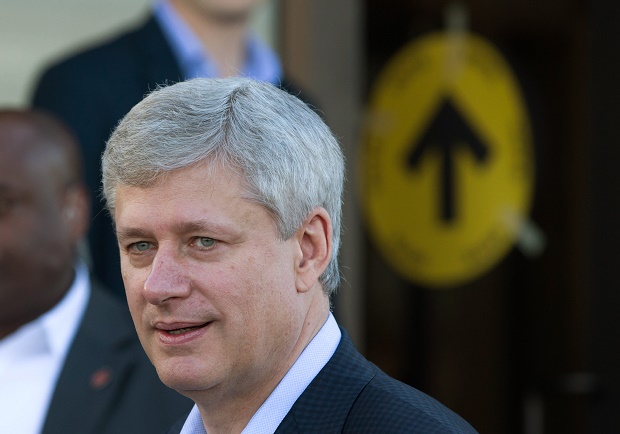Harper battles Liberal icon’s son in Canadian elections

Conservative Leader, Prime Minister Stephen Harper, leaves a polling station after casting his ballot in the federal election in Calgary, Alberta, on Monday, Oct. 19, 2015. Canadians voted Monday to decide whether to extend Harper’s near-decade in power or return Canada to its more liberal roots. DARRYL DYCK/THE CANADIAN PRESS VIA AP
TORONTO — The Liberal Party of Justin Trudeau took an early lead in Canadian elections Monday that pitted the son of one of Canada’s most famous politicians against Stephen Harper, the Conservative politician who has led the country for almost a decade.
Canada has shifted to the center-right under Harper, who has lowered sales and corporate taxes, avoided climate change legislation and clashed with the Obama administration over the Keystone XL pipeline. But after nearly 10 years in power, he has trailed in opinion polls behind Liberal leader Justin Trudeau, the son of the late Prime Minister Pierre Trudeau.
Polls have closed throughout Canada’s Atlantic region. It will be a while before the rest of the country catches up, with the last of the polls closing in Canada’s Pacific Coast province of British Columbia at 10 p.m. EDT (0200 GMT).
In races in Newfoundland and Labrador, Liberal candidates are being elected or are leading in six of the province’s seven districts.
Trudeau, who has re-energized the Liberal Party since its devastating electoral losses four years ago, promises to raise taxes on the rich and run deficits for three years to boost government spending. His late father, who took office in 1968 and led Canada for most of the next 16 years, is a storied name in Canadian history, responsible for the country’s version of the bill of rights.
Article continues after this advertisement“We have a chance to bring real change to Canada and bring an end to the Harper decade,” Justin Trudeau said in Harper’s adopted home province of Alberta, traditionally a Conservative stronghold.
Article continues after this advertisementA Trudeau victory would ease tensions with the US Although Trudeau supports the Keystone pipeline, he argues relations should not hinge on the project. Harper has clashed with the Obama administration over other issues, including the recently reached Iran nuclear deal.
Trudeau, a 43-year-old former school teacher and member of Parliament since 2008, would become the second youngest prime minister in Canadian history if he wins.
His opponents pilloried him as too inexperienced, but Trudeau embraced his boyish image on Election Day. Sporting jeans and a varsity letter jacket, he posed for photo standing on the thighs of two his colleagues to make a cheerleading pyramid, his campaign plane in the backdrop with “Trudeau 2015” painted in large red letters.
Harper, 56, visited districts he won in the 2011 election in an attempt to hang onto them. On Saturday, he posed with Toronto’s former crack-smoking mayor, Rob Ford, in a conservative suburb.
Hurt when Canada entered a mild recession earlier this year, Harper made a controversy over the Islamic face veil a focus of his campaign, a decision his opponents seized on to depict him as a divisive leader.
Paula Mcelhinney, 52, from Toronto, voted Liberal to get rid of Harper.
“I want to get him out, it’s about time we have a new leader. It’s time for a change,” she said.
But Harper’s “protect our economy” message resonated with Anne Collis, a 61-year-old Toronto voter.
“It was a tough decision for me. I normally vote Conservative, but this election I wavered between him and the other parties because Harper can be a bit of a bully,” Collis said. “But in the end I like what he’s done.”
A minority government in the 338-seat Parliament appears likely no matter which party wins the most seats, said Tom Flanagan, Harper’s former campaign manager. That would mean the winning party would have a shaky hold on power and need to rely on another party to pass legislation. Harper has said he’ll step down as Conservative leader if his party loses.
If the Conservatives win the most seats, the Liberals and a third party, the New Democrats, say they will band together to bring down the Harper government in a Parliamentary vote, raising the possibility of a coalition government or arrangement.
“It’s hard for me to see a path for his survival now,” Flanagan said. “When you play out all the scenarios they all seem to end with a defeat on election night or a very tenuous victory that would not allow Harper to survive very long.”
RELATED STORIES
Canada less welcoming to refugees under Harper’s leadership